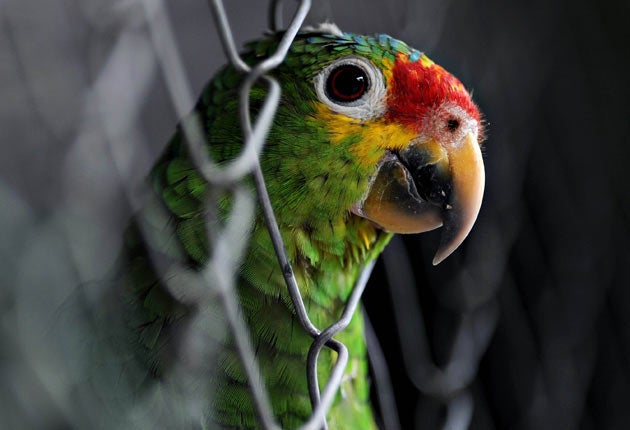Robert Chalmers doesn't like... Endangered species

Harsh though it may seem, this is the truth of it. You were a crap animal and you failed miserably to keep pace with a swiftly changing world. In the unlikely event of anyone wanting to see you again – being as you are the last specimen on the planet – they'll have to visit the taxidermy room at their local natural history museum. Your time's up and you know it. Don't come whining to us about it.
How many hours have I wasted watching TV documentaries where minor celebrities are despatched to scour the tropics in search of some doomed but exotic parrot? One of these presenters – whose name I omit because he, too, is now extinct – even did it on Radio Four: a series that induced not so much a sense of boredom as a sapping of the will to live.
I really wouldn't mind animal conservation enthusiasts if they were even-handed. There are over 1,500 animal species on the endangered list. But take a look at most leaflets and websites, and all you see are the same old faces. If you're a bird, you'd better be spectacular, and by the way it was that swankily garish plumage that dropped you in it in the first place, given that even a myopic predator can spot you at 500 paces.
The most popular mammals have big eyes, vaguely troubled expressions and really nice fur. The master of shameless empathy-generation is the giant panda, its every gesture pleading for rescue despite the fact that (to bowdlerise one of Bernard Manning's less malignant observations) even a panda won't copulate with a panda. Why encourage them? I was stopped in the street not long ago by someone collecting money in a pail decorated with a picture of a snow-leopard; one of that elite group, like the sea-otter, the Iberian lynx and the Siberian tiger, of noble beasts flirting with oblivion. The latest recruit, hogging the headlines this week, is the Peruvian condor.
We all have living things that we'd prefer the planet to be purged of – tapeworms, bed-bugs, cats etc – but, when you're campaigning to save a species, what makes you pick and choose? Researching this column, I discovered that the Congo dung beetle isn't exactly at the top of its game at the moment, but I don't hear anyone defending that poor little feller's case. Feel like saving the Lion's Hill velvet worm? Possibly not, because Peripatopsis leonina is two inches long, ugly and vicious, and assails its prey by drenching it in malodorous slime discharged from tubes in its anus. Stop me in Crouch End Broadway when you're out collecting for him and I might drop a few quid in your bucket. Why? What can I say; it's a behaviour pattern I can relate to. I'm a journalist. I've worked with guys like that.
Some animals just have it coming. There are several web pages dedicated to the dodo. "When the Portuguese reached Mauritius in 1598," one author says, "it greeted the visitors with childlike innocence." The sailors mistook the bird's attitude, he continues, "for stupidity. The world was poorer for its passing."
Poorer? I've thought long and hard about this. I have a pretty unenviable time of it, trust me. Just the stuff that happened to me last Tuesday would have finished some people. But I can't think of a single episode, ever, in my whole life, that would have been significantly enhanced by the presence of a dodo. Nor do I pine for those other long-vanished species: the great auk; the laughing owl, which reportedly last sniggered in 1914, or the conformist moth.
When you do help them, are they grateful? The distinguished online magazine The Onion once ran a report with the headline: "Peregrine Falcon Acting Pretty Cocky Since Being Taken Off Endangered Species List."
"Once considered a creature of nobility and grace, it has been transformed into an 'unappreciative jerk' one expert said." The falcon ("known for its distinctive markings and pompous fat face") has, The Onion report continues, "infuriated environmentalists by reclaiming its habitat without so much as a thank you, frequently and loudly mating in everyone's face" and "generally acting like 'king sh*t' wherever it goes."
The disappearance of any unique life-form is never pleasant to witness. Nobody actually wishes for the demise of the grizzled skipper (an endangered butterfly, since you ask) the Siberian sturgeon, or Preble's meadow-jumping mouse.
The reality is that, for many species, the combination of global warming, pesticide use, over-fishing and trophy-hunting will be too powerful for any protected breeding programme to counteract. Nothing, after all, endures forever. Except, perhaps, for that immutable law which dictates that, in almost any environment it's the more savage, ruthless and cunning beasts that survive. You might not like it. But isn't that, after all, what evolution is?
Picture by Ralph Steadman from the Levi/Aldhous Project: Ghosts of Gone Birds
Join our commenting forum
Join thought-provoking conversations, follow other Independent readers and see their replies
Comments
Bookmark popover
Removed from bookmarks